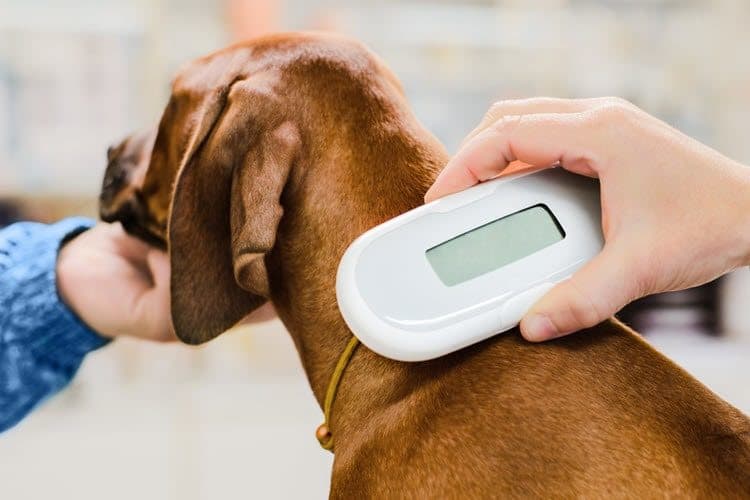Have you been contemplating getting your pet microchipped but want to know more details before you make that decision? Microchipping a dog is very affordable and a great idea for any pet. According to the American Humane Society, around 10 million pets are lost within the U.S. every year.1 If your pet is microchipped, this will increase the odds that your pet will be returned safely to you.
In this article, we will review how much a dog microchip costs and other frequently asked questions about dog microchips.
What is a dog microchip?
A dog microchip is a small transponder that can be implanted by a veterinarian under your dog’s skin between the shoulder blades. This electronic chip is about the same size as a grain of rice.2 Unlike GPS tracking collars for dogs, a microchip cannot be tracked from a mobile device.
Anytime a stray dog is brought to a veterinary clinic or animal shelter, the first thing the staff will do is scan the dog for a microchip. Your pet’s microchip has a unique identification number that appears when your pet is scanned. If the pet’s microchip is registered online, your contact information will be associated with the microchip number so you can be contacted and reunited with your pet.
How much does microchipping your dog cost?
The average cost to get a microchip for your dog from a veterinary clinic is around $50 to $60 which includes the cost for the microchip, the implantation fee, and registration of the microchip number. This price may be more or less depending on your location. You may be able to get your dog microchipped for as little as $22 at VetIQ Pet Care veterinary clinics, which are veterinary wellness centers located within certain Walmart and Meijer stores.
Is there a monthly fee for microchips for dogs?
Most microchips have a one-time lifetime registration fee that is usually incorporated into the cost of microchipping at the veterinary clinic. Many microchip companies have subscription-based services that give you added features and benefits. These monthly subscriptions are not required to keep your pet’s microchip registered. You can check to see if your pet’s microchip is registered by visiting the AAHA Universal Pet Microchip Lookup.
Is it worth it to microchip your dog?
It is definitely worth it to microchip your dog. The American Veterinary Medical Association reported that microchipped dogs were returned to their owners about half of the time, whereas those without microchips were only returned around a quarter of the time.3 This means that if your pet is microchipped, they are more likely to find their way back to you if they run away or get lost.
Is microchipping a dog painful?
A microchip is implanted under a dog’s skin with a large needle. The needle is larger than the needle used for vaccination. There may be brief pain when the needle is inserted into the dog’s skin, but this pain is usually minor and short-lived. Some dogs hardly notice the pain from microchip implantation. Implantation of the microchip can be done without surgery or anesthesia.4
At what age can you microchip a dog?
I recommend microchipping your dog as soon as possible as microchipping can be done at any age. Some veterinarians will microchip puppies as young as 6 weeks of age. Other veterinarians may want to wait until 12 to 16 weeks of age, especially in small and toy breed dogs. The sooner you can get your pet microchipped, the better.
How long does a microchip in a dog last?

Most microchips were designed to last 20 to 25 years, so they’ll typically last your pet’s entire life.5 Once implanted under the skin, the microchip should continue to work for years. Occasionally, a microchip will stop working, so it is a good idea to have your veterinarian scan your pet’s chip once per year to ensure that the chip is still functional.6
Can I track my dog’s microchip?
A dog microchip cannot be tracked. A microchip is simply an identification chip implanted under your dog’s skin that has to be scanned with a microchip scanner. If you are interested in trackable identification for your dog, you should consider purchasing a GPS tracking collar or tag for your dog in addition to having your pet microchipped. GPS trackers for dogs will allow you to track your dog’s location if they get lost.
How do you know if a dog is microchipped?
Most veterinary hospitals and animal shelters have the capability of scanning a dog for a microchip. If you are not sure if your dog has been microchipped, you can ask a veterinarian to scan your pet to check for a microchip. Once they give you the microchip number, make sure that the number is registered to your name and contact information. Also, if you find a stray dog, you should contact a veterinary clinic or animal shelter so they can scan the dog for a microchip.
Will my dog still need identification tags after microchipping?
Your pet will still need to wear identification tags even if they are microchipped. If your pet runs away, your dog will be more quickly reunited with you if they are wearing ID tags. Also, your pet will still need to wear its rabies tag to show that it is up to date on its rabies vaccination. If your dog’s collar falls off when it gets lost, the microchip will be the only way that your pet will be able to be identified and returned to you.
Where can I get my dog microchipped?
If you are interested in getting your dog microchipped, you should contact your local veterinarian. Most veterinary clinics have the capability of implanting microchips into dogs. Call your veterinarian to see how much this procedure will cost and to make an appointment to get your pet microchipped.
- See Also: What Is the Cost of a Dog in Australia?
- “Every day is tag day™” — is your pet protected? Americanhumane.org. Published April 1, 2019. Accessed February 9, 2021.
- Reisen J. It’s National Chip Your Pet Month: here’s how and why you should do it. Akc.org. Published May 7, 2018. Accessed February 9, 2021.
- Microchipping of animals FAQ. Avma.org. Accessed February 9, 2021.
- Hunter T, Ward E. Microchipping your dog. Vcahospitals.com. Accessed February 9, 2021.
- Ingwersen W. Everything you ever wanted to know about microchips. Can Vet J. 1996;37(11):667-671. Accessed February 9, 2021.
- Microchipping of animals. Avma.org. Accessed February 9, 2021.
















